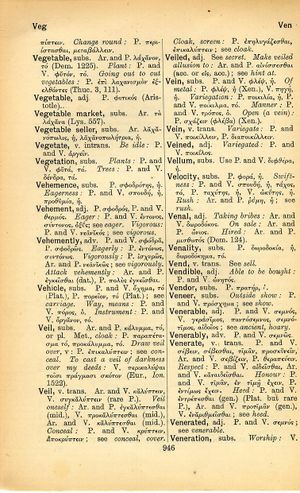vehicle: Difference between revisions
From LSJ
Ὁ δὲ μὴ δυνάμενος κοινωνεῖν ἢ μηδὲν δεόμενος δι' αὐτάρκειαν οὐθὲν μέρος πόλεως, ὥστε ἢ θηρίον ἢ θεός → Whoever is incapable of associating, or has no need to because of self-sufficiency, is no part of a state; so he is either a beast or a god
(Woodhouse 5) |
(CSV5) |
||
| Line 1: | Line 1: | ||
{{ | {{Woodhouse1 | ||
| | |Text=[[File:woodhouse_946.jpg|thumb|link={{filepath:woodhouse_946.jpg}}]]'''subs.''' | ||
P. and V. [[ὄχημα]], τό (Plat.), P. [[πορεῖον]], τό (Plat.); see [[carriage]]. | |||
<b class="b2">Way, means</b>: P. and V. [[πόρος]], ὁ. | |||
<b class="b2">Instrument</b>: P. and V. [[ὄργανον]], τό. | |||
}} | }} | ||

